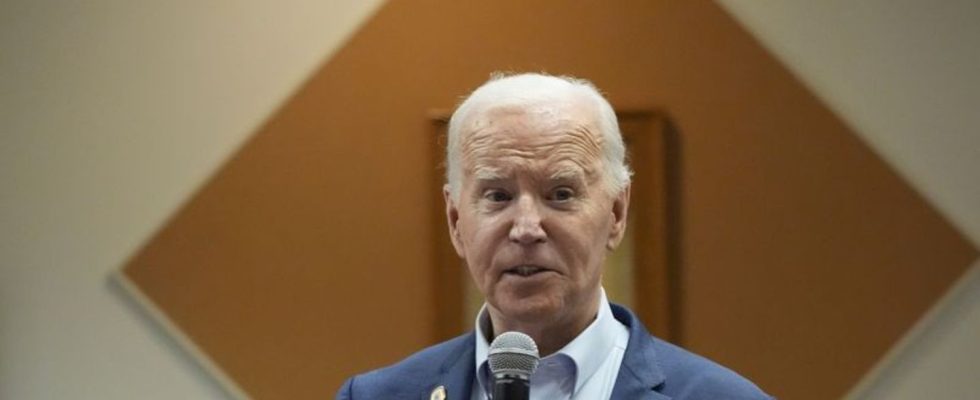There are fears of a new war in the Middle East. The USA and the EU want to stop Iran. Baerbock speaks to Israel’s head of government again. The news at a glance.
The USA and the EU want to prevent a new war in the Middle East with new sanctions against Iran after its major attack on Israel. The sanctions were aimed, among other things, against the Islamic Republic’s missile and drone program and would be coordinated with allies such as the G7 states, said the US President’s security advisor, Jake Sullivan, in Washington.
Shortly before, EU chief diplomat Josep Borrell had also announced new sanctions. Federal Foreign Minister Annalena Baerbock wants to work in Israel today to ensure that the crisis is not further fueled. “Nobody can now add more fuel to the fire,” said Baerbock before her departure in Berlin.
This applies especially to Iran and its proxies. It is still unclear how Israel will respond to the Iranian attack at the weekend. After her visit to Israel, Baerbock will travel to Italy for the G7 foreign ministers’ meeting, where the conflict situation in the Middle East will also be discussed.
Iran attacked Israel on Sunday night with hundreds of drones, rockets and cruise missiles, but they were almost completely intercepted. The attack was in response to a suspected Israeli-led airstrike on the Iranian embassy compound in Damascus that killed two Iranian Revolutionary Guard generals on April 1. Experts now see a major risk of war in the Middle East.
Israel’s Foreign Minister: Iran must be stopped
Israeli Foreign Minister Israel Katz said he was leading a “diplomatic offensive” and had written to dozens of governments to call for more sanctions against Tehran. These should accompany a “military response,” he wrote on the X platform (formerly Twitter), without giving details. “Iran must be stopped now – before it is too late,” said Katz.
After a video link between the foreign ministers of the EU states, EU chief diplomat Borrell said he would ask his team to prepare for further punitive measures. “We will expand and tighten the sanctions regime (…).” He did not say when the planned new sanctions could come into force.
In addition to the Iranian missile and drone program, Washington’s new sanctions announced by US Security Advisor Sullivan are also intended to affect supporters of the Iranian Revolutionary Guards and the Iranian Ministry of Defense. The Revolutionary Guard is Iran’s elite military force and is more influential than the country’s regular army. In recent years, the USA had already imposed far-reaching sanctions that, among other things, targeted Iranian oil trade. They are intended to prevent the arch-enemy of the nuclear power Israel from developing nuclear weapons and ballistic missiles.
Experts warn of further escalation
Israel’s ambassador to Germany, Ron Prosor, announced a retaliatory strike against Iranian military facilities. Israel’s Defense Minister Joav Galant said any enemy that fights Israel becomes a target itself. “The Iranians will not be able to create a new status of deterrence against the State of Israel,” Galant said. If Iran and Israel continue to attack and counterattack, “this will lead to a real escalation,” warned Ofer Fridman, an Israeli ex-officer and military expert at King’s College London, in the Wall Street Journal.
“Such an escalation spiral slips away very quickly and very easily because both escalation and de-escalation are risky for both sides,” said conflict and protest researcher Tareq Sydiq from the University of Marburg to the German Press Agency. “You don’t know exactly how the other side will react and at what point war will become inevitable. I would rate the risk as very high.”
Baerbock again in Israel
To prevent a new war from breaking out, diplomatic efforts are in full swing. In Israel, she will assure her interlocutors “of Germany’s full solidarity and we will talk about how a further escalation with more and more violence can be prevented,” said Baerbock before her surprisingly announced visit – her seventh since the attack by Islamist terrorists on Israel on October 7th. “It is now important to stop Iran without encouraging further escalation,” she said at a meeting with her Jordanian colleague Ayman al-Safadi in Berlin.
In addition to Netanyahu, the Green politician wants to speak to her Israeli colleague Katz and Benny Gantz, who is a member of the war cabinet. She then travels to the meeting with the foreign ministers of the G7 round of economically strong democracies on the Italian island of Capri.
British Prime Minister advises Israel to exercise caution
British Prime Minister Rishi Sunak advised caution in a telephone conversation with Netanyahu. A significant escalation is in nobody’s interest. During the conversation, Sunak reiterated Britain’s support for Israel’s security and stability in the region, the British government said. Iran has badly miscalculated and is increasingly isolated internationally while the G7 group is preparing a diplomatic response.
The focus of the G7 consultations in Capri, which will last until Friday, will also be Israel’s military action against the Islamist Hamas in the Gaza Strip and the devastating humanitarian situation of the civilian population there. In addition to Germany, the G7 round includes the USA, Canada, Great Britain, France, Italy and Japan. Italy is the chair this year.

